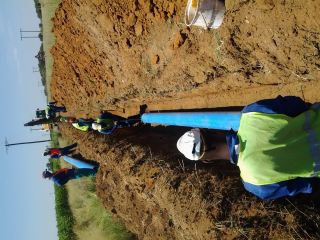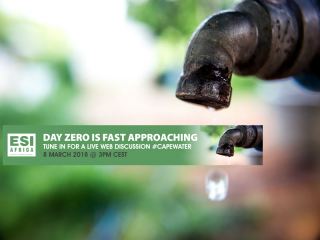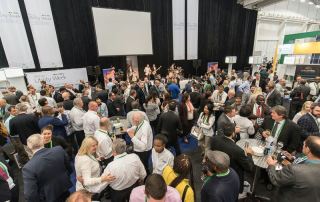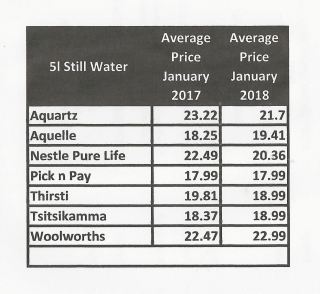Plastic Pipes help SA through toughest drought in decades
South Africa is currently in the grips of one of the worst droughts in decades, with five of the country’s provinces already declared drought disaster areas. The Western Cape, and Northern and Eastern Cape and Limpopo are the areas facing the most serious lack of water, with the Mother City counting down the days to the predicted “Day Zero”, when the province’s taps will run dry.
Could the problem have been avoided?
Whilst environmental factors such as El Niño and climate change are to a large extent to blame for the country’s crippling water woes, the Southern African Plastic Pipe Manufactures Association (SAPPMA) says that lacking and aging water infrastructure has exasperated the problem.
“We have started to sound the first alarm bells as early as 2010 over the lacking water infrastructure and the failure by local municipalities around the country to invest in upgrading and replacing their pipelines. We saw signs of severe water losses in distribution caused by water leaks and wastage many years before the crisis reached its full impact,” says Jan Venter, Chairman of the SAPPMA – a non-profit association that represents more than 80 % of the plastic pipe produced in South Africa and focuses its efforts on ensuring pipe systems that are leak-free and durable for long-term use. It also focuses on the rehabilitation of old pipelines.
Venter confirms that the impacts of the severe drought could have been negated had their calls for water infrastructure improvements been heeded earlier by the authorities.
“Pipelines lie at the heart of South Africa’s infrastructure and must be replaced before they fail. Water distribution, waste disposal, irrigation and telecommunications all rely on pipelines to function. However, the majority of South Africa’s pipelines were installed in the early 1950’s and 1960’s, and were manufactured from cement, asbestos or steel. These old pipes have an economic lifespan of a maximum of 50 years and have long since corroded and disintegrated. This became evident many years ago as we started seeing an increase in water leaks and disrupted water supplies around the country. Millions of liters of treated water have been going lost every year,” he says.
Municipal investments into improving water infrastructure
Towards the end of 2017, the City of Cape Town announced plans to spend R8 billion on its water infrastructure over the next 10 years. According to Anic Smit, Head of Planning, Design and Projects of the City of Cape Town's water reticulation services, the city has invested R1.2bn on water engineering, refurbishment and replacement infrastructure during the 2015/16 financial year. “Intensive planning has already taken place to allow for the scale (and cost) of new and upgraded infrastructure, as well as a number of projects to avert the drought situation. These include desalination plants, groundwater extraction and treated effluent reuse,” Smit said.
During the past 12 months alone, the CoCT has spent at least R500 million on replacing aging infrastructure, repair burst pipes and expand pipelines in and around the Mother City. “We have installed more than 40 km of HDPE pipes by pipe cracking and open trench methods,” Smit said. “In many cases we have opted for trenchless pipeline methods to fix burst pipes for both water and sewer mains as part of the City of Cape Town’s pipeline replacement initiatives. This reduces the overall project time and proves less disruptive and inconvenient for local residents and road users and allows us to replace long lengths of pipe without digging long trenches”.
The CoCT also supports the recently unveiled master plan by the Department of Water Affairs and Sanitation, entitled “War on Leaks”, whereby national government aims to reduce municipal water losses estimated at R7,2 billion a year due to leaking pipes, from 35% to 15%.
Plastic pipes vs other materials
“We prefer using plastic pipes and pipe fittings for our City’s infrastructure, because international studies have proven that these pipes last in excess of 100 years. In this regard we follow the example of international metropoles such as London and Sydney where HDPE pipes are being used to replace old infrastructure. When manufactured correctly and meet international standards, these pipes are cheaper, quicker and easier to install, do not rust, the joints are leak-proof (if installed correctly) and have lower failure rates than pipes made from alternative materials,” Smit says.
For this reason, the CoCT insists that all HDPE and PVC pressure pipes being installed bear the SAPPMA mark as guarantee that the pipes comply with the relevant national & international quality standards.
“We have revised our tender requirements and specifications to include SAPPMA as an additional quality reassurance measure. In addition, we are also insisting that all bends on HDPE pipes comply with SANS 6269 and that pipe installers have valid IFPA certificates as it gives us a guarantee and the necessary peace of mind that the pipes we are installing comply with international standards and will be able to do the job for many years to come without the risk of pipe failure”. plastic pipes and drought twoVenter adds that HDPE and PVC pipes also offer low frictional resistance. “Their hydraulic properties remain virtually unchanged over its useful life, resulting in lower energy use and pumping costs. Because they are also available in a range of sizes and pressure ratings, are lightweight and easy to handle and to join, it is little wonder that they are the preferred material for modern infrastructure,” the SAPPMA CEO says.
Looking ahead and planning for years to come
Commenting on how the Cape Town drought has impacted the future outlook for the rest of southern Africa, Venter says: “It is indeed a very sad reality that our country is currently facing. Because this water shortage will undoubtedly affect the rest of the country’s economy and the way we look at our water resources in future, it is important that we all work closely together to get out of this crisis and prevent a repeat scenario in the years to come.
Apart from relying on plastic pipes to bring the much-needed water from water sources such as desalination plants to communities in the very near future, we also have plan for the long term. Areas elsewhere in the country where water and rainfall are still in abundance, should learn from the lessons learnt by the Western Cape and ensure that they have upgraded their water infrastructure with HDPE and PVC pipes bearing the SAPPMA mark. Investing in replacing old and failing pipes today will allow us to save enough purified water to significantly reduce the impact and long-term effects of the below average rainfall which we are expecting to become the new normal. Consumers, engineers and other decision makers must empower themselves with knowledge and information on the benefits of using plastic pipes versus other materials,” Venter concluded.
ESI Africa to host water expert webinar on technology to overcome Cape Town's impending Day Zero
Operating a business without water is an unfathomable thought; however, a very real reality for the industries, agribusiness and commercial operations in and around Cape Town.
ESI Africa is hosting a live free-to-attend webinar discussion on Thursday, 8 March 2018, addressing the current water situation in the City of Cape Town, South Africa and the available technologies, strategies and solutions, to overcome the challenge.
“The looming Day Zero is not endemic to the City as other areas in South Africa and globally are experiencing drought conditions” says Nicolette Pombo-van Zyl editor of ESI Africa. “What is unique is that if Cape Town does in fact reach Day Zero – the day when taps are turned off - it will be the first major city world-wide to have reached this unimaginable point of no return,”The resulting economic impact as agri-business, construction industry, smelters and commercial concerns grind to a halt will be catastrophic.”
She adds: “it is imperative that we find alternative means to manage and replenish our water sources, whether this is from groundwater supplies or reducing waste of potable water in the reticulation system – suitable technologies must be explored.”
“With the one-hour webinar on 8 March, we will gather large water consumers, water sector professionals, owners of businesses that use water as its main revenue driver, or public sector water professionals to share and gain greater insight into current plans to increase bulk water supply; and what technology solutions are available to implement in their businesses to support water best practice. It is also an opportunity to ask our expert presenters real-time questions.”
“Among the concerns raised are the impact this has on commerce and industry, and national plans going forward to better manage bulk water supply,” states Pombo-van Zyl adding that through this webinar global cities and major industrial hubs can learn from Cape Town’s current predicament.
The webinar, which provides a platform for discussion is the “ideal virtual space to connect the dots between policy, strategy and technology, and to discover innovative practices in water management,” says Pombo-van Zyl.
Working with the annual African Utility Week conference, and as its official host media publication, ESI Africa is aligned in the message that Cape Town remains open for business. The event will have a strong focus on water with the conference showcasing how partnerships, financial models and latest technological advances can make the greatest impact in meeting Africa's water demand.
“As a major event in the City, African Utility Week plays a crucial role in contributing towards the in-ward bound travel market,” says the event director Evan Schiff, “by holding the event as planned, African Utility Week will continue to support the Cape Town economy as we cannot allow for there to be massive job losses on top of a water constrained situation.”
Who should attend?
If you are a large water consumer, a professional in the water sector, own a business that uses water as its main revenue driver, or are a public sector water professional – this one-hour webinar on 8 March is for you.
Webinar discussion points:
• Desalination technology solutions
• Temporary and permanent solutions
• Impact of drought on commerce
• Water-saving reticulation methods
• Strategy and the way forward
The online-based event is organised by ESI Africa, a leading B2B publication within the power and energy sectors. With over 20 years’ experience in the industry, ESI Africa delivers high quality technical and trending information to both a print and online audience. Having hosted a number of successful webinars covering an array of topics from nuclear, renewables and tariffs, water is the latest edition to a very dynamic product offering. ESI Africa is a brand of Spintelligent, a multi-award winning Cape Town-based trade exhibition and conference organiser.
Webinar date and time: Thursday, 08 March 2018, 15h00 CEST
Online Event registration: https://goto.webcasts.com/starthere.jsp?ei=1179382&tp_key=000ea8346a
ESI Africa: Senior content creator| Ashley Theron-Ord
Telephone: +27 21 700 3590
Email: This email address is being protected from spambots. You need JavaScript enabled to view it.
African Utility Week to focus strongly on meeting the continent’s water demand in Cape Town in May
Event going ahead as planned despite water shortages
Investment in water solutions is needed by the public and private sector to enable universal access, water security and resilient societies. African Utility Week will have a strong focus on water again this year from 15-17 May in Cape Town when the strategic water conference will showcase how partnerships, financial models and latest technological advances can make the greatest impact in meeting Africa's water demand.
“We want utilities to start thinking out of the box on water solutions, capabilities and solutions,” says Gerardt P. Viljoen, Managing Director of Sensus SA and GM for Sensus in Africa, an event sponsor and one of the expert speakers at the water conference at African Utility Week.
He continues: “the water situation in South Africa is not only worrisome it should be considered as THE top priority for any form of economic sustainability. Increasing storing capabilities, reviewing traditional catchment areas and weather pattern changes, recycling of water and waste water treatment, network infrastructure maintenance and demand side management should all be top NATIONAL priorities going forward.”
The Sensus SA MD adds: “it’s important to not only have smart metering. Smart metering should be intelligent. How to make smart metering intelligent and use it to solve infrastructure, supply and demand issues is what we are all about this year.”
The full interview with Gerardt Viljoen can be read here: http://www.african-utility-week.com/Sensus-interview Sensus is a returning gold sponsor at the event.
Event going ahead as planned despite water shortages
Meanwhile, the organisers of African Utility Week have assured all stakeholders in this long running conference and exhibition that the event will go ahead as planned despite the current water restrictions in Cape Town.
“As a major event in the City, African Utility Week plays a crucial role in contributing towards the in-ward bound travel market,” says event director Evan Schiff, “by holding the event as planned, African Utility Week will continue to support the Cape Town economy as we cannot allow for there to be massive job losses on top of a water constrained situation.”
He adds: “at present, no events have been cancelled by the City, Provincial or National Government. Working together, we have ensured that each responsible party is doing what it can to ensure water savings and keeping events water-neutral. To this end, African Utility Week has engaged the City, venue, suppliers and all surrounding hotels to ensure that every opportunity has been taken to reduce water use and guarantee that attendees will have access to water.
”Please consult the African Utility Week website for FAQs on attending the show and managing your water usage.
Award-winning energy platform
The 18th annual African Utility Week will gather over 7000 decision makers from more than 80 countries to discuss the challenges, solutions and successes in the power, energy and water sectors on the continent. Along with multiple side events and numerous networking functions the event also boasts a seven track conference with over 300 expert speakers. The conference programme will address the latest challenges, developments and opportunities in the power and water sectors: ranging from generation, T&D, metering, technology and water.
The African Utility Week expo offers an extensive technical workshop programme that are CPD accredited, free to attend, hands-on presentations that take place in defined spaces on the exhibition floor. They discuss practical, day-to-day technical topics, best practices and product solutions that businesses, large power users and utilities can implement in their daily operations.
AUW wins two more AAXO ROAR Awards!
Earlier this month, African Utility Week won its second and third AAXO ROAR Awards (Association of African Exhibition Organisers) when it was named Best Trade Exhibition in 2017 in the 12000+ sqm category, as well as the Best Overall Exhibition for 2017.
Co-located to African Utility Week is another AAXO award winner for best confex in 2016, the African Real Estate & Infrastructure Summit, an international platform that brings together the full spectrum of the African real estate and infrastructure sectors.
African Utility Week is the flagship energy event organised by the multi-award winning Spintelligent, leading Cape Town-based trade exhibition and conference organiser, and part of Clarion Events Ltd, based in the UK. Other well-known energy events by Spintelligent are Future Energy Nigeria and Future Energy East Africa.
Dates for African Utility Week:
Conference and expo: 15-17 May 2018
Awards gala dinner: 16 May 2018
Site visits: 18 May 2018
Location: CTICC, Cape Town, South Africa
Website: http://www.african-utility-week.com & www.african-real-estate-summit.com
Twitter: https://twitter.com/AfricaUtilities #AUW2018
Linkedin: African Power Forum
Contact:
Senior communications manager: Annemarie Roodbol
Telephone: +27 21 700 3558
Mobile: +27 82 562 7844
Email: This email address is being protected from spambots. You need JavaScript enabled to view it.
Water Watch in Cape Town
The prolonged drought in the Western Cape and the threat of “Day Zero” has given rise to fears of price hikes in bottled water yet Retail Price Watch, the consumer price watchdog, has found that major retail chains in the region are sticking to 2017 prices for 5l bottled water.
The net effect is that there has been a rush on bottled water and many stores have found themselves temporarily out of stock, says Viccy Baker of Retail Price Watch.
“Under normal circumstances demand pressure would have increased the price of the larger sizes, but instead stores have been offering specials which have cleared their shelves, even if only for a short time,” she says.
“Retailers are to be commended for not capitalising on the shortage although it is very likely that consumers who are already very angry about the way the water crisis in the Western Cape has been handled, would not tolerate large price hikes,” she says.
“On 25 January Woolworths in the Southern suburbs of Cape Town which sells its house brand for R22/5litres, was offering 2 bottles for R31 and the shelves in most stores were cleared before lunchtime.
“Pick n Pay and Checkers Blue Route were out of stock but promising deliveries on 26 January while Checkers Muizenberg is selling its house brand Eastern Highlands for R15 a bottle.”
Judy Woodgate of Tstsikamma Crystal Water in the Eastern Cape says that demand has been “unprecedented” with her sales managers witnessing people fighting over the last bottle of water on shelves in supermarkets in Cape Town.
“We have been besieged not just by retailers but by members of the public who want to buy at source because they cannot buy from the stores,” she said.
“We are bottling as fast as we can and have an order book which will fill 31 trucks all headed for Cape Town in the next week.”
Woodgate offers a caution to homeowners wanting to buy large quantities of water – many opting for truckloads of more than 5000 litres - that storage in the sunshine can offer water deterioration over time.
Baker says that empty 25l plastic bottles have been sold out at stores such as Mambo’s and Plastic World.Monique Hector, a spokesman for Mambo’s confirmed that the Cape stores had experienced increased demand and had sold out. “We are expecting deliveries but cannot say when.”
Baker says that over the past year prices of 5l bottled water around the country have generally stabilised (see Table below).
A Muizenberg resident Heather Hirschman (57) who lives on the 10th Floor of her apartment block said the 87 litres per day that Capetonians had been allowed over the past few months was far too much given the current crisis and that the authorities should have acted earlier to restrict the use of water further and to hike the price for higher levels of water usage. “It is inconceivable that older or disabled people will be able to manage to carry 50 litres of water per day from taps to their homes,” she said.





